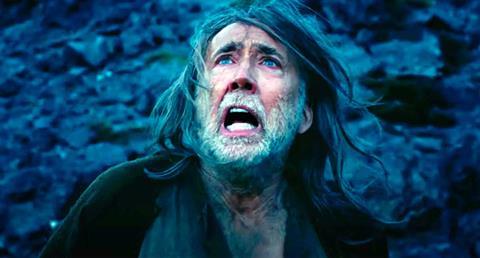The Carpenter’s Son is based on the apocryphal Infancy Gospel of Thomas. Sam Hailes is breaking his usual rule of not getting worked up about films. This one feels like a deliberate provocation, he says

When the comedy writer Graham Linehan imagined Father Ted parading around with a placard reading, “down with this sort of thing!” he was rightly ridiculing people who get offended about everything.
I must have come across this now famous meme at some point in my teens and quietly vowed never to be “one of those” Christians who are permanently angry and forever sending their friends yet another petition to sign.
This magazine has always tried to engage with culture rather than simply shout at it.
I may not like playing the grumpy Christian. But there is a time and a place for bold denouncement. And when Hollywood insists on making a horror film based on a “Gospel” which has never been considered authentic by any part of the Church for the past 2,000 years, it seems clear to me that we’re being trolled.
The Carpenter’s Son is coming to cinemas later this month. It’s a “biblical horror” starring Nicholas Cage and is based on the Infancy Gospel of Thomas which depicts the boy Jesus at war with demonic forces. It’s been described as a “dark and violent take” on the childhood of Jesus.
There are 66 books in the Bible – with many of them brilliantly suited to being turned into a narrative film (think: Exodus, 1 Samuel, The Gospels, Acts etc). Instead, Hollywood has chosen an apocryphal “Gospel” written in the 2nd century and rejected by both Eastern and Western Christians. Thomas has never been considered part of the biblical canon – partly because upon reading it, you realise it’s a bit mad… the young Jesus curses and kills a fellow child who bumped into him accidentally, for example. He also strikes people blind.
Of all the stories Hollywood could have told, why pick this one?
Let’s retire the claim that it’s impossible to make a faithful biblical film. The Chosen has proved that it is possible to depict biblical stories in an engaging and creative way. Writers can devise interesting sub plots while still staying true to the big picture. There’s more than enough Christians around the world who will not only watch it, but in the case of The Chosen, even contribute to a crowdfunding campaign to keep it going. Hollywood cannot credibly argue there’s no audience for Bible stories on the big screen.
As for presenting this as a “biblical horror” – I am aware that some Christians enjoy and appreciate horror movies, and there is a genuine case to be made it’s the only genre which treats the supernatural seriously. Nevertheless, most Christians tend to avoid such movies – and with good reason. Both testaments warn believers away from the occult and Philippians urges us to think on things which are “pure, lovely, commendable…”
Director Lofty Nathan must have known how provocative he was being with The Carpenter’s Son. And yet instead of admit this, Nathan has released a weaselly-worded statement which talks about his grandmother being a “devout believer” and being raised in the Orthodox Church. I’m obviously happy he had a good experience of the church as a child. And I mean no disrespect. But so what? Attending church as a child doesn’t give any legitimacy to your decision to produce a film as an adult that intentionally provokes millions of Christians. His statement reads like a deeply flawed and unconvincing attempt to use the faith of his childhood to somehow pacify his Christian critics.
When Hollywood makes a horror film based on a “Gospel” which has never been considered authentic by any part of the Church, it seems clear we’re being trolled
Nathan concludes his statement by linking his work to the Sistine Chapel (I’m not making this up). See for yourself: “From the Sistine Chapel’s visions of heaven and hell to Dante’s Inferno, images of terror and the supernatural have historically deepened the faith by illuminating what is at stake in the human soul. To look unflinchingly at evil is, paradoxically, to better understand the necessity of the good. That is the spirit in which I made The Carpenter’s Son.”
There’s an obvious problem with the defence that this director is merely making Christian art. When Michaelangelo painted The Last Judgement on the ceiling of the Sistine Chapel, he was inspired by the actual Bible. Not an apocryphal book which all Christians everywhere have agreed is blasphemous nonsense.
Let’s be clear: Nathan has every right to make whatever film he likes. He is entitled to freedom of artistic expression and freedom of speech just as much as anyone else. To almost quote Voltaire, I disapprove of the film he’s making, but I will defend to the death his right to make it.
I don’t want to live in a world where blasphemy is a crime. But I also don’t want to live in a world where Hollywood continually pokes Christians by messing around with our sacred stories and thinks it’s ok. Sometimes you need to say something. And today I’m saying, with all sincerity: Down with this sort of thing!
What do you think? Will you be watching this film? Do you think Premier Christianity should review it? Let us know in the comments below






































1 Reader's comment